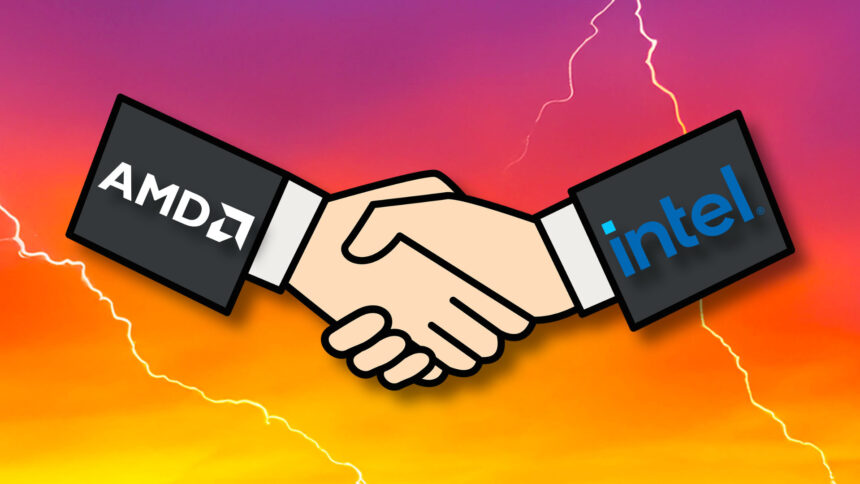Peace in our time, or so AMD and Intel would like you to believe. These bitter frenemies are clubbing together to protect and develop the x86 standard for desktop and laptop gaming CPUs and to fight off the threat from upstarts like Arm and Qualcomm via a new working body called the x86 Ecosystem Advisory Group.
AMD and Intel have dominated the PC market with x86-based processors for decades, and if you’re looking for the best gaming CPU, you’ve been stuck choosing between them. That’s starting to change, however. Powerful and energy efficient alternatives, such as the Qualcomm Snapdragon X range, pose a serious challenge, and the two companies are looking to fight back against the threat.
In a joint press release, Intel and AMD announced that the new working group will “shape the future of the world’s most widely used computing architecture” for PCs. Don’t let the dull name fool you, because this new group could hold the key to defending AMD and Intel’s CPU duopoly, as well as leading to new and better next-gen CPUs for PC gamers.
According to the two companies, the desired outcomes from the x86 Ecosystem Advisory Group are improved choices for consumers, simplifying guidelines and improving consistency across x86 products from both AMD and Intel, and making it easier to create and integrate new capabilities as they’re developed. There hasn’t been any specific plans or ideas announced yet as to what this might look like, but one example could be to reduce the redundant work that AMD and Intel have been doing separately to remove legacy code from the x86 instruction set.
This is all set against the backdrop that x86 CPUs are “on the cusp of one of the most significant shifts… in decades”, at least according to Intel CEO Pat Gelsinger. AMD’s CEO and Chair, Lisa Su, also suggested that the new group will “ensure… x86 architecture continues evolving as the compute platform of choice.”
Both AMD and Intel stress that, despite the “vigorous” competition, there’s already a long history of cooperation between the two companies, with the press release mentioning the efforts to help develop the USB, PCI, and PCIe standards, in particular.
It’s not just AMD and Intel forming this club, either. The new group will include executives from several companies with a vested interest to help forge a new path, including Broadcom, Dell, Google Cloud, HP, Lenovo, Microsoft, Oracle, and Red Hat, along with a few influential characters like Linus Torvalds (the Linux founder) and Tim Sweeney, Epic Games’ CEO.
Competition is a healthy thing for consumers, and there are signs that the battle for controlling the desktop and laptop CPU market is heating up. For example, Apple abandoned x86 for its own Arm-based CPUs back in 2020, while earlier this year, Qualcomm Snapdragon X CPUs launched as part of a new set of Windows Copilot+ laptops, in direct competition against Intel Lunar Lake CPUs. Nvidia could also be getting in on the action, with Nvidia CPU rumors popping up last year.
For now, though, AMD and Intel will continue to hold the lions share of the market for gaming CPUs on desktop and laptop devices. With new AMD Ryzen 9000 series already out and next-gen Intel Arrow Lake processors launching next week, new gaming PCs are likely to continue to launch with AMD and Intel CPUs for years to come.
Thinking about an upgrade? Our best gaming PC guide has plenty of Intel and AMD-powered options to choose from, including the Acer Predator Orion 5000, a great option for 1080p and 1440p gaming.










